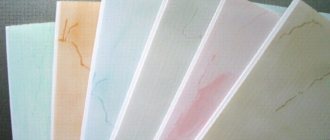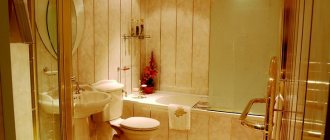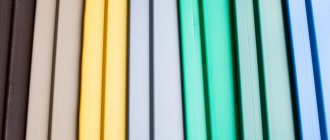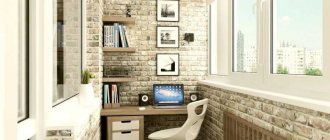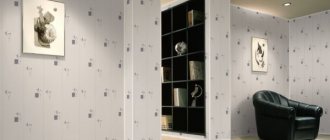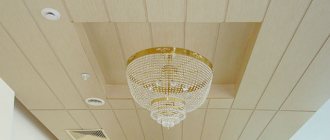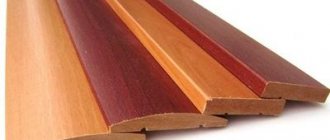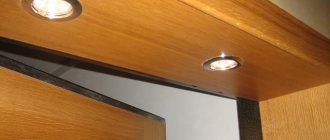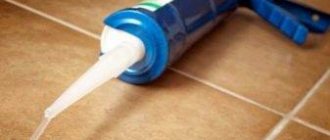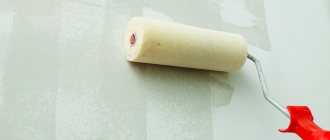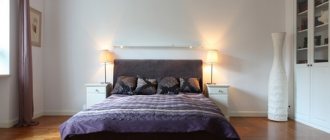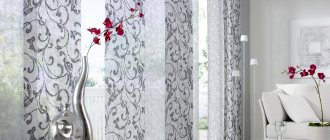Finishing with MDF panels has become widespread.
Recently, it is increasingly possible to find room finishing made with MDF panels. Moreover, they not only decorate walls, but also decorate arches, doorways and ceilings. This option is popular for good reason; the variety of panel types makes it possible to create any hallway design. The huge variety of finishing options using panels is simply amazing.
Panels on the walls in the corridor
MDF panels are made from environmentally friendly materials, essentially dust obtained from sawdust. Despite such a good natural composition, wall panels are used mainly for decorating corridors.
The panels on the walls in the corridor have a wide variety of colors and textures; thanks to well-chosen color schemes, the room looks chic.
Installation of panels can be done in several ways:
- Diagonally in a single color or combined in several;
- Vertically of a single height or in several panels and in different colors;
- Horizontally with a combination of colors.
Another design solution is the combination of installation types. A corridor with a horizontal and diagonal method of installing panels looks very impressive. The panels can imitate wood or tiles; thanks to their special texture, a visual effect is created. Caring for this type of finish is very simple - if necessary, just wipe with a damp cloth.
Self-adhesive wallpaper is also very popular. The range of such wallpapers is impressive. Read about it on the website:
Beautiful examples
MDF wall products can be installed in a wide variety of rooms, from active rooms and cafes to rooms in apartments or houses. Many builders may associate such finishing material with “official” and boring decor, but in fact this is not the case - thanks to the chic choice of colors and textures, beautiful and stylish compositions can be created from such panels. At the same time, in the interior decoration of rooms, products not only with imitation wood, but also other natural materials look good
In addition, wall sheets can be perfectly combined with various inserts, so you can get a stunning design effect. When choosing panels for decorating a living room, it is important to consider what functions the room will perform and how many spatial zones it consists of. Most often, the walls of the living room are decorated with products in a classic style.
They do this in such a way that they are a kind of continuation in the decor of the fireplace, doorways, stairs and other interior items. It is recommended to alternate panels of light and dark wood or combine two shades at the same time. For example, the living room looks original, in which one wall is lined with light oak panels, and the other with dark wenge panels.
- In addition, in rooms that combine a recreation area and a dining room, you can make combined horizontal paneling. Dark-colored material will be placed below half the wall, and light-colored material will be placed on top. To hide the places between color transitions, it is recommended to install additional decor from a wooden plank. Walls that are paneled vertically from floor to ceiling also look interesting in living rooms. Due to the fact that the material attached to the base acquires a plank structure, the surface becomes striped, as a result of which the space visually expands.
- Laminated MDF products will become a real decoration for the kitchen. As a rule, for this type of room, materials with imitation wood and natural stone are chosen. With the right design, such panels will help make the room modern and stylish, filling it with homeliness and comfort. Most often, veneered or laminated MDF boards are used for the kitchen - they are close to wood in their beauty and structure, so it is recommended to place them in the dining area.
- In addition, MDF wall panels can completely replace ceramic tiles in the kitchen, as they have great superiority over them. A dining area decorated with such panels will take on an interesting look. The choice of material color depends on the size of the room. For small kitchens it is recommended to use light panels, and for spacious rooms you can use maximum imagination and combine wood-look MDF sheets with panels of a different texture. Thus, you will get an unusual interior that allows you to visually divide the kitchen into several zones.
- Partitions covered with wall panels also look good in the kitchen. In this case, it is best to give preference to sheets of expensive veneer or varnished tiles. Products with photo printing also look unusual on such partitions.
- A common problem in kitchen design is the difficulty of choosing a finishing material for covering the work area, which is located between the lower and upper rows of furniture. Thanks to moisture-resistant MDF panels, these places can be turned into a real work of art. To do this, tiles with a pattern are selected and additionally covered with glass. Thus, you get a beautiful apron that will harmoniously fit into any style.
- MDF panels are also widely used in the design of hallways. Since this room is always furnished and is small in size, to cover its walls you need to choose the right shape, texture and color scheme of the finishing material. It is advisable to give preference to light shades - they will hide the lack of space in the room and visually expand the boundaries of its space.
The soft texture and unusual shades of the panels will not only radically change the look of the room, but will also give it a harmonious image. Due to the fact that the material is characterized by high moisture resistance, it can be used to cover walls anywhere: near the shower stall, between wall-mounted furniture and near the washbasin. In addition, the products perform zoning of the room and add chic to the interior.
To learn how to install MDF panels on a wall, watch this video.
Types of panels in the corridor
As a rule, corridor walls require finishing with materials that are easy to wet clean. The modern construction market offers a wide variety of finishing materials with good moisture-resistant qualities.
Types of panels in the corridor:
- PVC panels are easy to maintain and come in a variety of colors;
- MDF panels - ease of maintenance directly depends on the outer coating of the panels;
- Sandwich panels are plastic sheets, easy to clean with plain water and a napkin;
- Tamburat slabs are three-layer MDF or chipboard slabs with cellular cardboard inside;
- Fiberboard, chipboard panels are a rather short-lived material and require a solid foundation for the walls.
When choosing MDF panels as a finishing material, it should be taken into account that the main difference between the panels is the type of coating. The most impractical and at the same time cheapest are panels with a paper coating and a pattern printed on it. Panels with a laminated coating or covered with wood veneer can be considered more practical and at the same time expensive. The Eurolight company offers matte, glossy and glossy metallic panels with a thickness of 38 and 50 mm.
A large selection of alternative solutions for decorating a room. Eco-friendly and versatile wall materials:
Materials
The hallway wall panels must not only fit into the interior, but also meet the necessary properties (lighting, humidity, air temperature) of the room.
Externally, they are also selected taking into account the characteristic features of the hallway, so that the finishing result pleases the owners, and not vice versa. There is an opinion that decorating walls with panels is a sign of minimalism and low-cost renovation, but this is a misconception. The market offers us a huge number of colors and materials for their manufacture:
- Plastic. PVC panels are considered a relatively inexpensive finishing material. But they are easy to clean, are not susceptible to water, and also have a variety of decor - from imitation wood to tiles.
- MDF. These are slabs made from compressed wood chips. They are much lighter than wood. This material is a good sound insulator, and if you purchase MDF panels with special impregnation, they will not be afraid of moisture. They can be textured or even more beautiful thanks to milling on the front side.
- Wooden. This material is environmentally friendly, always gives the interior solidity, but at the same time requires balance with other parts of the decoration. The panels are made multilayer and are highly resistant to heat, humidity, mechanical stress, and ultraviolet radiation. You can often find wood from walnut, oak, birch and other valuable species. There are models with carvings interspersed with other materials.
MDF panels: corridor in an apartment
The walls in the hallway are most susceptible to various types of contamination. It is best to decorate a corridor in an apartment with MDF panels. They have all the necessary properties for such a small room. Wall panels allow you to complete finishing as quickly as possible.
Main advantages of MDF panels:
- The panels are moisture resistant, which allows for wet cleaning without fear of damaging the surface of the material;
- There are fire-resistant panels;
- The surface of the walls is smooth after finishing with panels;
- The panels increase thermal insulation;
- The thickness of the panels is up to 16 mm, they minimize square meters during finishing;
- They are quite light and do not weigh down the structure.
An undoubted advantage is the variety of color shades, allowing for the maximum implementation of various design ideas in the interior.
The MDF lining has locks along both sides for fastening the panels to each other. There is a rare option where locks are also provided at the ends for splicing along the length. The shape of the panels can be square or rectangular, reminiscent of tiles.
Material about the types and methods of installing ceilings made of MDF panels will also be useful:
Benefits of use
All MDF panels include dry wood fibers, which are pressed and exposed to high temperatures . Thanks to this processing, lignin is released from them, due to which the fibers are reliably connected to each other, and also ensures high strength and durability of the panels.
This material is quite dense (from 650 to 850 kg/m3) and can be thick, which is why MDF panels are often associated with wood.
Due to their composition, such wall panels have a huge number of positive characteristics :
Due to their practicality and durability , MDF panels can reliably protect and decorate hallway walls for a long time, but during installation it is extremely important to adhere to certain rules, and you must also provide them with careful care.
With all the abundance of positive properties, MDF wall panels can be classified as inexpensive finishing , so you won’t spend too much money during the renovation process.
Find out why glass partitions are good in an apartment and what possible interior decorative options can be obtained using such original designs.
Read in this article about vertical bimetallic heating radiators, their characteristics and features.
Hallway design with MDF panels
The design of a hallway with MDF panels can be made using a combination of various options.
In addition to color options, there are different types of plastic panels:
- Wooden lining resembles slatted panels, their thickness is from 8 to 12 mm, height is 2.5 - 3 meters;
- Mosaic compositions can be created using tile panels, their thickness is 7–10 mm, and the length varies from variety to 1000 mm; such panels imitate tiles well;
- The largest panels are sheet panels, their height is up to 3 meters, width up to 1.5 meters and thickness from 3 mm to 12 mm.
In addition, not the entire wall can be covered with panels. The corridor in the house looks original, lined with MDF panels up to half the wall. The options can be varied, for example, wallpaper on top and MDF sheathing on the bottom, or the top part is covered with MDF wall panels and the bottom with PVC.
A PVC wall panel is not much different from MDF, and is cheaper; for a dirtier area of the wall near the floor, plastic panels are ideal if the design is chosen in a certain tone.
MDF panels come with 3D relief. They look very original in the decoration of the upper part of the wall. Modern technologies have made it possible to diversify MDF panels as much as possible, not only in color and external characteristics.
This decorative material can be divided into:
- MDFV;
- Ordinary MDF;
- Laminated;
- Cork;
- Veneered;
- Fire resistant.
Ordinary MDF is not particularly resistant to moisture and damage. These panels are inexpensive and are best used in dry rooms. Laminated panels have recently appeared on the market, but have gained popularity due to their resistance to damage. MDFV is a moisture-resistant MDF with a protective layer against moisture, thanks to which the panels can be easily washed with water. Cork panels are quite expensive; a thin layer of cork is applied to their surface. Veneered panels are clean environmental materials; a cut of natural veneer is applied to their surface.
Colors
The color of the panels, like any other finish, is chosen depending on the overall interior design. Although the color range of this type of design is not as diverse as, say, wallpaper or decorative plaster. If we talk about a wide range of colors, then the advantage here is on the side of plastic models.
Plastic panels are made with various shades, designs and patterns. The remaining types are produced with an imitation of natural color.
The most common option is wood-look panels. Shades can range from light to dark. Suitable for the hallway of owners who do not want to highlight at least this part of the house in the eyes of guests. This design is unobtrusive, simple, calm. This classic design can be done in any style.
For modern decor, you can choose shades of bleached oak or wenge. But don’t forget that dark shades would be a bad choice for a small corridor.
If you prefer a wood color, try not to let the furniture blend in with the walls. Keep the contrast.
An original and quite popular design solution these days is stone finishing. The options are very diverse - from light, translucent minerals of blue, dark blue, green to brick, dark shades. Finishing with stone can give a room some luxury and elegance. You can, on the contrary, create an ascetic image, imitating a brick wall. This option is typical for the loft style. In any case, finishing with stone will give the room originality and will attract the attention of everyone entering the apartment or house.
This is interesting: Characteristics of water-type heated towel rails (22 photos)
Combination of wallpaper and panels in the corridor
Corridors with high ceilings require special design attention. The large volume needs to be filled somehow and the solution would be to combine wallpaper and panels in the corridor. This is a popular type of finishing, and it can easily be done with your own hands, and there are plenty of options for combining materials.
Besides, you can always experiment and come up with something completely new:
- Horizontal combination in stripes;
- Vertical combination with stripes;
- Combination of wallpaper inserts into some areas of the panels;
- Combining shapes;
- A top-bottom combination, in which the panels can be located both at the top and at the bottom, although it makes more sense to define the panels down.
With the help of combined finishing, even very bold design ideas can be turned into reality. By using a variety of combination methods, you can create a truly unique hallway interior. Joints when separating areas of wallpaper and panels should be decorated with moldings, borders or friezes.
To give a city room the effect of a country house, you can use wood-look wallpaper. Read about it on the website:
Decorative techniques
When choosing a finishing material for walls, pay attention to its texture. In accordance with the designer’s idea, you can choose canvases to match stone, leather, plaster, textiles, wood, frescoes and other options
At the same time, do not forget that for the hallway you need to choose easy-to-care materials.
To create an unusual, original atmosphere in your corridor, you can use various techniques:
Combination
You can put dark wallpaper on the lower half of the wall, and lighter wallpaper on the upper half. They will add light and make the corridor visually wider, and the dark bottom will be a barrier to soiling the wall.
When decorating with combined wallpaper, you need to carefully select shades so that they combine well. For example, you can cover part of the wall near the floor with a canvas with a vertical pattern, and above it with plain or finely patterned wallpaper. The combination of these types of wallpaper is made with a baguette selected in accordance with the design of the entire room.
To attract attention to the design on the canvas, you can use various moldings, panels and appliqués. This way you can create an individual, unique design in your hallway.
For example, on one wall there will be wallpaper in the form of a floral pattern on a greenish background, and on the other there will be a canvas with vertical beige stripes. You can visually expand the room with this finishing option.
If in a long corridor the wall near the entrance is covered with darker wallpaper with an ornament, the opposite wall with lighter wallpaper, and at the junction you build an arch or trim it with panels, then such a corridor will look shorter. This way you can get two different functional zones.
You can combine finishing materials of different colors like this - decorate the entrance area using a dark color, and then lighten it using a gradient and make a gradual transition, for example, from dark green to light green.
Modern wall decoration in the hallway with MDF panels: photo
Quite often, MDF panels are used to decorate not only walls, but also ceilings. This material gained popularity for its good finishing qualities. The panels are a good substitute for wood and at the same time imitate it very well.
You can often see paneling that cannot be distinguished from wooden lining. For a harmonious hallway design, you should take into account the overall interior of the entire apartment.
Decorating walls with panels is not appropriate in all rooms, and is more often used for finishing:
- Corridors of apartments and houses;
- In the kitchen;
- On a loggia or balcony;
- In the dormitory when decorating common areas.
Decorative panels can be partially used when decorating walls in living rooms to highlight some design ideas. It is worth noting that, due to its environmental friendliness, the panel material can still be used for complete wall decoration even in bedrooms, but rarely does anyone create such an office style in a space intended for sleeping.
Scope of application
MDF panels are widely used for interior decoration. They are used to decorate floors and ceilings, make furniture from them, and even transform entrance doors. This popularity is no coincidence, because MDF boards can not only hide uneven walls, but also improve the interior in the shortest possible time and without unnecessary dirt. They can be mounted in any direction; it is convenient to “hide” wires and communications behind them. In terms of cleaning, it is enough to wipe their surface with a damp cloth, and no chemicals are used.
MDF wall boards can be slatted (long and narrow), externally resembling wooden lining. Rectangular or square tiles are similar to tiles, and sheet tiles are wide, smooth sheets. Thanks to the variety of shapes, you can modify the room, visually narrowing or expanding the room.
Depending on the application, the installation of MDF sheets has its own characteristics.
- Due to the unevenness of the walls, the panels are often mounted by attaching them to aluminum profiles. If the walls are smooth, it is permissible to use the adhesive method. The glue should be thick and retain plastic properties after drying, which will prevent the slabs from deforming or shrinking.
- If you plan to decorate the ceiling, the panels for it should be lightweight and easy to attach. The optimal solution would be to use slatted panels, the connecting elements of which are liquid nails, a special adhesive solution or a construction stapler.
- The material is adjusted to length using a jigsaw or circular saw, and you can fasten it alone. But to install tile or sheet MDF, you will need at least one assistant, which is not always convenient.
- Dense moisture-resistant sheet panels are laid on the floor. If the sheets are laid on a subfloor, it is worth using slabs whose thickness exceeds five millimeters. If installation is carried out on logs, you should choose MDF from ten millimeters thick.
- In any case, before work, the base should be leveled and cleaned, and then the slabs should be laid staggered. The gap between the panels and the walls is 2–4 millimeters, and the distance between the panels themselves is 2–3 millimeters. Fasteners should be installed along the perimeter of the panels in increments of 10–15 centimeters. Then they begin to sand the surfaces and putty the joints, and only then paint. The MDF base can be used under laminate or any flexible finishing material.
The design of the front side of MDF panels is also varied. In addition to the usual flat products obtained through the pressing process, there are plates with a relief surface. The three-dimensional design obtained as a result of stamps, stickers or milling looks original, but quickly becomes dirty, and such panels will have to be wiped much more often.
Transparent glossy or matte polymer coatings are glued onto laminated boards over decorative films to protect the panels from mechanical damage. The veneered front sides of the boards reproduce the natural wood grain, and matte or glossy shades of painted surfaces will become a stylish interior decoration.
What is better for finishing corridors with PVC or MDF panels?
The building materials market offers a huge selection of wall panels. It’s worth figuring out what’s better for finishing corridors with PVC or MDF panels. Sometimes the differences between them do not play a big role, but it is still worth knowing them.
PVC panels:
- Consist of plastic;
- May be harmful by vaporizing substances when heated;
- They are inexpensive;
- Moisture resistant;
- Perfectly smooth;
- Resistant to damage;
- Used for finishing walls and ceilings.
PVC panels have many good qualities; they are well suited for installation in damp rooms and corridors precisely because of the ability to wash the panels if necessary.
MDF panels:
- Consist of pressed sawdust;
- Do not harm health;
- Reasonable price for some types;
- Not all types are moisture resistant;
- The surface can be either smooth or textured;
- Not all species are sufficiently resistant to damage;
- They are used to decorate walls, less often ceilings.
As you can see, panels made from both materials are quite affordable, and the surfaces finished with them are smooth. The color palette is also varied; a noticeable difference is the composition of the panels.
For people who prefer naturalness, MDF panels are more suitable for finishing the corridor. MDF panels are less commonly used for ceilings, and for a corridor it is quite possible to combine MDF walls with a PVC ceiling.
You can learn how to install PVC panels on the ceiling with your own hands from the material:
Preparing for work
Having decided to decorate your hallway with MDF panels yourself, you should worry in advance about stocking up on the required amount of materials. You should calculate the surface area that you are going to cover with MDF in order to calculate the number of panels required for the job.
In this case, the decisive factor when calculating the number of panels will be the width of the area to be covered with panels.
Calculation of the required number of panels should be made taking into account their width. The most common standard width is 15 cm, but panels are available in 19 or 24 cm widths.
To calculate the required amount of MDF per wall, you need to divide the width of the wall by the width of the type of panels you have chosen. Based on this, you will determine the amount of MDF that you should stock up on before starting work. Please note that panels should be purchased with a small margin in case of an error or unexpected defect. In addition to the panels, you will also need special moldings.
Before covering the walls with panels, pre-treat the surfaces in the hallway with special disinfectant compounds. This will allow you to avoid the appearance of mold or mildew in problem areas of the wall in the future.
Important: preliminary preparation of walls for MDF cladding does not require puttying and plastering of the walls or cleaning them of old paint. You just need to remove the old baseboards from the floor.
Decorating the hallway with plastic panels: design and photos
Plastic panels are one of the options for finishing the walls and ceiling of the hallway. They are widely used in office and residential premises and have many advantages. Using plastic panels you can quickly give surfaces a smooth and decorative look. Installation can be done independently, without resorting to the services of specialists.
Decorating the hallway with plastic panels can be combined with other materials:
- Goes well with MDF panels on the walls;
- A combination of a ceiling made of plastic and walls made of MDF panels is possible;
- An excellent combination with wallpaper, both on the walls and on the ceiling - plastic, walls - wallpaper.
High-quality plastic panels are harmless to health, have high moisture resistance, are quite strong and durable. The panels fit well into the overall interior of the apartment and are perfectly combined with interior items.
Installation features
The technology involves the use of two main methods of fixing panels.
- Installing parts with glue. It is necessary to carefully prepare the base to eliminate any unevenness. This option is most often used in combination with wallpaper. This avoids the border being too protruding.
- Fastening to the sheathing. The frame is built from wooden beams, but can be made from a metal profile. This method allows you to quickly obtain a flat surface, place additional heat and sound insulation and hide communications. Lathing makes it possible to use complex combinations of panels.
How to panel a corridor
Decorating the corridor with panels with your own hands will not be difficult. More often, the panels are attached to a metal or wooden sheathing, but if the surface of the walls is smooth, the panels can be attached without a frame by gluing liquid nails to glue.
Smooth walls are rare, and it’s worth taking a closer look at the basics of frame installation:
- Frame slats should be used at least 20*40 mm wide;
- All frame parts must be installed using a level;
- The distance between the slats must correspond to the size of the panels.
The wall sheathing must be securely fastened, and it is better to fasten the panels to the sheathing with special hooks - clamps.
To frame the junction of the panels with the floor surface, it is necessary to make and secure a floor plinth, and ceiling plinths at the ceiling joint.
When choosing a molding for the ceiling, pay attention to the material from which it is made. Read about it:
Existing mounting options
If there are no distortions on the concrete surface, it is perfectly smooth and clean, there is a layer of strong plaster, and the putty does not peel off, then you can glue it directly to the adhesive-sealant. You need to distribute the glue in zigzags or dots over the entire board, then press it to the surface for a few seconds. Later, take it away from the wall for a second and apply it again forever. Protruding excess is removed with a knife or spatula. It’s better to watch a video of how experienced specialists do it. A metal frame can also be a reliable foundation method. For these purposes, you can use profiles - UD and hangers. This technology is suitable if you are going to:
Advice. In this case, it is better to install beams instead of metal slats, so the structure will be stronger and more stable. Where you need to install an electrical outlet or switch, make a hole of the required diameter with an electric drill.
The socket box (mounting box) is selected the same as for plasterboard sheets.
Design and decoration of the hallway with MDF panels (photo examples)
Review of manufacturers
Among domestic manufacturers of brick wallpaper, the first line is occupied. It was formed in the mid-90s of the last century. During this period, the company became a leader not only in the domestic market, but also abroad.
The specialists of this company daily analyze the building materials market and fashion trends, introduce and create new products in this segment. Most of the products are exclusive wallpapers, created by the world's best minds. The product quality is at the highest level, even in the economy segment.
Russia is represented in the ranking by one more. This manufacturer has ten years of experience. It produces its products from environmentally friendly raw materials and using European equipment. Excellent combination of price and quality.
The world leaders in this area are companies from the United States of America. Such high indicators are achieved not only due to high technologies and accumulated experience, but also due to the cooperation of this country with manufacturers from all over the world.
American brands are not afraid to experiment and annually release dozens of new collections designed both for domestic buyers and for export.
Among American manufacturers we can highlight the companies Wallquest, Fresco, Living Style. In the domestic market, wallpapers that imitate brickwork from Chesapeake, Nextwall and Tiffany Design are widely popular.
Analyzing customer reviews, we can state that they also highlight English manufacturers. First of all, due to environmentally friendly components, and secondly, for its commitment to the classic style. Although it is worth noting the fact that the UK is also developing modern collections designed for the hi-tech style. In Russian construction stores you can find wallpaper from Chelsea Designs, Prestigious Textiles and Sanderson.
Belgian companies - Calcuta, Grandeco and Omexco made history thanks to the creation of seamless wallpaper. This became possible after “crossing” paper, non-woven fabric and textile materials. By the way, their vinyl wallpaper was the first to be painted over the entire surface.
Germany has been a European leader in both the electronics and construction markets for decades. Thanks to established technologies and design ideas, companies such as Decor Deluxe, Architects Paper and P + S International take their place in the sun.
But manufacturers from the Netherlands have gone the furthest in terms of realism. They succeeded in recreating three-dimensional pictures and optimistic scenes. This contributed to the fact that they were included in the ranking of manufacturers with good performance. Manufacturers Eijffinger, Esta Home and BN International work only with modern components and keep up with the times.
Italian wallpaper is the standard of quality. Every second manufacturer from this country produces collections in classic, retro and loft styles. Their collections also include brick-like wallpaper. Non-woven and vinyl wallpapers are produced by the companies Decori Decori, Sergio Rossellini, Emiliana Parati. But in Russia the most famous brands are Roberto Cavalli and Limonta.
The Premium segment includes French companies – Casagedo, Casamance and Camengo. Unfortunately, their cost is not affordable for everyone, so they are not represented on the domestic market. But they are available upon individual order.
From time immemorial, Swedish wallpaper has been the most durable. They can easily withstand mechanical damage, have an unexpected design and are suitable for any room. The emphasis on safety is placed by MR Perswall and Borastapeter.
When choosing combined options for brickwork, wallpaper with silk-screen printing has proven itself well. The birthplace of wallpaper is the People's Republic of China. A few centuries ago, the Chinese were the first to use bamboo fabrics for interior decoration. Such wallpapers have a long service life. Among the Chinese manufacturers, Artshow and Loren can be noted.
Korean and Japanese companies produce fifteen-meter rolls to reduce seams. Companies such as LG, Oriental Coat, Fuji Kogua are rapidly conquering the market.
Among the countries of the former Soviet Union, manufacturers from Ukraine and Belarus occupy a worthy place in the domestic building materials market. They absorbed all the best that was in Soviet technologies and brought new ones from Europe.
Prices
The cost of wall panels largely depends on the type of processing and the material used. For each type of panel it is different:
- laminated – 290 rubles;
- PVC – 235 rubles;
- MDF -150 rubles.
How to use such a material as a glass wall panel for the kitchen can be found in this article.
Wall panels for finishing the corridor can be presented in various variations. Here you can change the color, texture, shape of the panels. But at the same time, it is necessary to understand that the main selection criteria remain such material features as strength, sound and heat insulation, and fire resistance.
